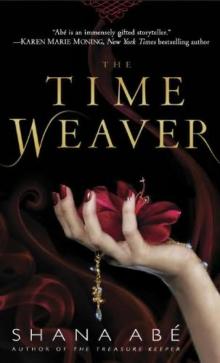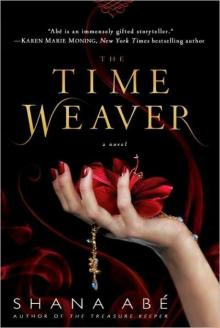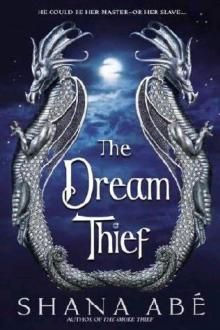The Treasure Keeper d-4 Read online
Page 3
And after that, I'll tell him of the dark cloak. Of the Gift. After. Journal Conclusion
I'm very sorry, Cerise. I know you're going to read this and worry. I would, in your position. Although I think perhaps we've only recently begun to be real friends, I've never doubted the bond between us. And so I begin this final entry with my apology.
This is my sad, roundabout way of keeping you in my life, even if it's merely through memories scratched on paper. I've always been hopeless at organizing, as you know, and so there was never any chance I would manage to pen an entry every day. But I believe most of the important events of my past few years have been recorded here. Enough to give you insight into what I'm about to do next.
You know Hayden left the shire, and you know why. Calm, loyal, meticulous: He was considered our last good hope of reaching the Zaharen drakon and brokering a peace with them. And everyone in the tribe knows now that the Zaharen sent us their princess Maricara in turn, bringing her horrible news. That the sanf inimicus, those human hunters, have discovered us, have killed at least two of our three emissaries—although we don't know which two.
That they've breached the shores of England. That only weeks ago they kidnapped and tried to kill the princess herself, and Lord Rhys. At least Maricara escaped, though heaven knows what happened to Rhys. We've had no word.
The princess claims that Lady Amalia and her husband Zane, still in hiding, are working covertly against the hunters. That Lia was the one who recently stole little Honor Carlisle from her home here. That Zane has infiltrated the sanf by pretending to be one of them.
I admit it was that last bit that sparked my mind and opened my eyes. If Zane, a human, not even one of our kind, would risk his life to help protect us .
I'm far from impulsive. I hardly need mention that. I tend to consider matters very carefully before taking action. How often have you complained about how long it takes me to select even a pair of garters for my stockings? You above all will realize how much I've mulled this over and over.
My position in the tribe is low, as is my influence. If I thought it would do an ounce of good, I would go before the Council and tell them of my Gifts, offer myself as anapparatus belli against this group of Others who have possibly murdered my fiance. But I think we both know how fruitless that would be. I'm female; I'm unwed; I might still breed. Nothing I could say would persuade them to view me in any fashion beyond those three overwhelming facts.
They would lock me away, by force if need be. They would do whatever they thought they must to keep me bound to the shire. Our history speaks most eloquently for itself.
I used to think the Council was a faction of stuffy old men, bleating stuffy old rules out of lethargy, or just blind fear. Time has tempered my opinion. Now I better understand why they've held so tightly to our traditions. We do need to stand united against these hunters. We need every weapon at our disposal, which is why I must go. I cannot Turn, but I have these Gifts. I am a weapon.
I never told you—or anyone—that after Hayden left, he would send me a note every week to let me know where he was, that he was well. It was something I required of him, and to his credit, he never failed me until his communications with the tribe ceased entirely. His last note placed him nearly to Paris, en route to Dijon. I'll start there.
I shall leave up to you whether or not to share this journal with anyone else in the tribe. I said good-bye to you and the children tonight in your beds, although you never saw me. It was a test, and I passed. So I must no longer delay.
No need to reflect upon all the horrors of tribal punishment should I get caught. We both know the consequences for disobedience of the laws, so suffice it to say, I do not plan to be caught.
I wish I could better explain to you why I'm doing this. I wish I had the wit or the words to describe to you why I'm chancing nearly all that I love with this decision. I must make do with this: You have always been the other side of me, my twin, my friend and rival. I've watched you blossom as a wife and mother without a scrap of envy. Yet it would be a lie were I to write here that I did not long for the same as you. Hayden was that promise for me, that hope. He was the key to my future here in Darkfrith: my husband and helpmate, the father of my children.
You will not be surprised, I think, when I tell you that I've always felt slightly apart from all the rest of the tribe, just a step out of tune with everyone else. Hayden offered me the chance to find my place in the music here. For perhaps the first time, I felt that with him, despite my differences, I could belong.
I do not know if this is the definition of true love. All I know is that I must find him. I must discover what's happened to him. I will bring him home again if I can.
For ages we've been instructed to guard our place here, to grow our roots into this soil. But against our will we've been thrust into this new age; the human world has evolved without us. The marquess and his wife, Lady Amalia, Luke, and Jeffery—all scattered to the winds.
And now Hayden has vanished. Rhys has vanished.
I'm going to vanish too.
Be safe, Cerise.
Forever love,
Your twin, Mlle. Zoe C. Lane
August 1, 1782
Chapter Two
Paris
September 1782
He'd been following her for three long blocks down the Seine. She did not walk quickly, which was one of the things he noticed first about her. Her pace was slow, often uneven; a demoiselle who perhaps had partaken of too much champagne with her dessert.
And shewas a demoiselle—or at the very least, a demimondaine. The sheen of her gown—satin without question, glimmering taupe by the smoky light of the street lanterns. The coat of fine sky-blue velvet she wore over it, edged with silk tassels that swayed in time with her oddly graceful gait. Even her hat, wide-brimmed and elaborately feathered, ropes of paste pearls draped around the band, the bow tied smartly beneath her chin. If she was a prostitute, she was an extremely successful one. Everything about her spoke of Means.
No question, there were other pigeons to be found tonight. With its theatres and operas and vendors, the musicians playing ballads on the bridges, Tuileries was always the most likely place in town to bump into a careless soul who didn't keep a firm hand on his purse, especially after the shows let out. But there was something about this girl, some compelling, mysterious pull from her . once she'd caught his eye, he found he couldn't look away.
She had a reticule over her left wrist, blue like the coat, with nice thin satin cords. Good enough.
She kept her own head down, watching the gutters and paving stones of Quai des Tuileries instead of her surroundings, pushing modestly through the crowds. Every so often her face would lift; it was only then he'd gain a swift glimpse of her nose, of her chin and lips. Dewy youth, lush beauty. He very much looked forward to seeing the rest of her.
But for now, Basile maintained his distance. He would not be so imprudent as to risk a glance directly into her eyes. It would not do to let her know he was studying her, and besides, there were still too many people about.
Her wig shone beneath the lanterns as well, the powder like none he'd seen before. He was not a man of great fashion, but he knew enough about wigs to recognize that hers was expensive. Definitely human hair, not horse, very fair and almost eerily natural. It wasn't even gray, but instead a glossy, glinting white. Two long, perfect coils spiraled down her back, bouncing like the tassels with every step, most fetching against the blue. It drew a man's eyes upward, to the nape of her neck. To the way the coat hugged the pretty slope of her shoulders.
Ah, the rich. What pleasures were denied them?
And yet as far as he could tell, his demoiselle walked the Quai alone, without a maid, without a footman. Without even a cabriolet to follow at a discreet distance. If she was meeting a lover, she was clearly reluctant about it. Perhaps the man was a toad.
The thought made Basile smile.
Over the clatter of horses and mules and carri
ages along the boulevard rose the soothing smack of the river pushing at her banks, the occasional echo in galld of the boatmen drifting below. The autumn night smelled of damp leaves and burning coal and steaming fresh manure. The clouds pressed low in the sky, shrouding the jagged points and peaks of the city in wet, misty soot.
The demoiselle slowed yet again. This time when she raised her head, it was to take in the sudden line of trees before her. They had reached the far end of the gardens of the Palais des Tuileries, enclosed by a wall taller than two grown men, the tips of chestnuts and black oaks waving their branches over it like hungry fingers in the night.
She muttered something he couldn't quite hear. It wasn't the first time she'd whispered words to herself, another peculiarity that had snagged his attention away from the pockets of the other nobles who packed the boulevards. It seemed to him that this time she asked herself a question. He watched as she gave a short nod—an answer to herself, no doubt—then strolled on.
The nearest gate to the gardens was yet another half block away; Basile knew it well. It was composed of thick rusty iron bars and a much more formidable new padlock, and sure enough, it was to there that the demoiselle wandered, weaving past a pair of interested army officers without even a sidelong look. The gate was in shadow. She walked close, one gloved hand closing upon a bar, and stood without moving.
Basile drew back to give her space, leaning a shoulder against the nearest lantern pole, glancing around them, considering the moment. It was growing late, and the hordes along the Quai were finally beginning to thin. A trio of merchants clacking their walking sticks strode past, arguing about cards and a woman named Ariane. From the other direction two sedan-chair men huffed along more slowly, cheeks and jowls flushed, the tall black lacquered wood of the box gripped between them beginning to bead with the moisture of the night.
A face peered back at him from beyond the window; kohled eyes, pasty flat skin; the lace curtain was quickly dropped.
When Basile looked again to the demoiselle, she was gone. The gate swung open, very gently, upon its hinges.
He straightened in surprise, then quickly looked around once more. But she hadn't continued down the Quai, and she hadn't retreated back toward him.
The gate still hung agape, a clear invitation.
So Basile accepted it. When he was near enough he discovered that the lock had been broken somehow, the bolt completely bent free of the base. The entire contraption had been dropped to the dirt just inside the gate. Very strange. The girl must have noticed the same thing and let her curiosity—or those voices in her mind—lead her into the gardens.
He'd been here before, of course. He knew all the best dark places of the city. The gardens of the old palace were officially forbidden to the common people who swarmed the streets surrounding them, but thrice a year the gates were opened for parades, and even the lowest of the city filth was allowed a visit inside.
Basile's mouth twisted into a smile. Vive le Roi.
The place was enormous, acres and acres of fountains and statues and hedges and trees. He'd lose her if he didn't hurry, so he stepped inside, melting at once into the gloom.
There were no torches lit along the neat rows of chestnuts and gravel before him, but he could nearly make them out anyway, the heavy black strings of trunks, the paler paths of crushed rock raked between them. He couldn't see the abandoned palace from here, not even a hint of the roof. There were no torches for it, either.
He stopped to listen. Trees creaking, almost no wind. The city past the walls strident enough, but quiet inside here, an unnatural hush. There would be insects at least, he thought, but heard none.
However—he did hear footsteps. Up ahead, to the right. Light, uneven.
He followed her as silently as he could, and that was very silently indeed.
One of the reflecting pools shone like a flat pewter disc through the nearest break in the trees. Basile found his gaze flicking to it again and again as he stole carefully forward, his eyes repeatedly drawn to that sole slick of light. He avoided a drift of withered leaves by a bench only at the last second, and just as he was inwardly cursing himself, dancing sideways to save himself from that one fateful loud step, a hand closed hard around his throat.
In front of him. And there was no one there.
He brought up both his hands to clutch at it. He felt the air squeezed from his larynx, trapped like a bubble tight inside his chest.
He was lifted high, entirely off the ground. His feet kicked out and met resistance: cloth, a great deal of it, like the skirts and petticoats of a gown. Basile rolled his eyes downward. It was a gown, taupe satin. It stood in the path without a body, without support of any kind. He could see clean down inside it. And beyond that, just beyond—a hat and coat against the base of a chestnut, tossed nearly out of view. A single dropped glove, still on the path.
Spots began to color his vision, bright light at last. He tried to cry out but only managed a wheeze; the grip on his throat did not loosen, but his boots hit the gravel again.
Beyond the spots—orange, blue, yellow—there was now a face gazing up at him. A beautiful face, more beautiful than he'd ever seen. A face from a nightmare, perfect and wintry calm, surrounded by locks of silky, silvery white.
"Good evening," said the demoiselle in a stroking voice. "Were you looking for me, sir?"
Basile wheezed some more, and the young woman nodded, serious.
"Perhaps I've been looking for you as well."
She had an accent. The slightest, slightest accent, not local at all—
He gave up clawing at her hand and took a swing at her instead, but she only leaned back, avoiding his fist. Yet her hold did loosen, just a bit, and he was able to suck in a fiery raw breath. The spots began to pop and fade.
The woman's eyes were absolutely black. The pupils and irises both, and then more, all of her eye, both of them, all black and shining and liquid like the pool, but infinitely, ominously more deep ...
Basile wet himself. He couldn't stop it. He felt the warmth trickle down his leg to his boot.
Voices. There were voices all around them, words he didn't understand, foreign words, English perhaps, and then words he knew: exchanges from earlier tonight, Nadette with the baby in her arms, shrilling don't come home without livres, Emile hailing him from across rue St.-Honore,come on, some wine, a little billiards, good fun, we'll find that girl at Cafe Caveau, she likes me you know—
"No," said the demoiselle abruptly, and dropped him to the ground. "You're not the one I want,
after all."
Basile had crumpled to a heap at her feet, but only for a second. As soon as he was able, he scrambled away from her, gasping and staring, his fingers gouging deep into the gravel. The woman gazed down at him without expression.
No, not a woman,he thought frantically, over and over,not a woman, not a woman, a demon, a monster—
"Still," she continued, sounding thoughtful, "it's not good for your soul to steal, is it? That is what you were planning. I think, Basile Cote, it's time for you to find a more laudable profession."
She walked away from him, moving nimbly now to the coat and hat she'd discarded before, gathering them into her arms, finding the lost glove too. She threw him a final glance from over her shoulder.
"Perhaps I'll be watching to see what you're up to, Basile. You never know."
And the monster walked off through the king's trees.
* * *
The Palais des Tuileries was known throughout certain quarters of Paris as the Grand Squander. It had been a royal residence once upon a time, but that was nearly a century past, and today it was merely an elaborate, empty reminder that the aristocracy could waste anything they wished, even a palace. The king and queen and their courtiers resided just outside the city in sparkling Versailles; Tuileries, with its vast drafty chambers and dim, dark-paneled hallways, was considered old-fashioned and unnecessarily dreary.
It was very nearly vacant. There were
a few retainers still living on the lower level, along with a handful of retired court officials who no doubt felt the sting of their banishment very sharply. Royal soldiers still patrolled the grounds, but it was monotonous, tedious work, and more time was spent furtively hunched over dice than actually walking about. After all, who would want to break in? The most lively occupants of both the gardens and the palace were the rats.
Curiously enough, however, the rats were hard to find lately. They had fled, in droves, in the pit of the night not quite one week before, along with all the ravens that had been roosting in the trees and the wild geese and ducks nesting in the grasses. And the mice from the stables. And the colony of rabbits that had dug generations of warrens beneath the western amphitheatre and its verdant slopes.
There were no animals of any kind left in Tuileries, in fact, except for two. One were the humans.
The other was creeping softly up the servants' staircase in the far southern segment of the left wing of the palace. The stairs were dusty, remarkably so, but there were no windows to illuminate the flight, and thus no easy way for anyone else to see her footprints. Still, she carried her shoes in one hand, hitching up her skirts and coat with the other, careful with the hems.
The silver-haired demoiselle emerged cautiously from the doorway that opened to the uppermost floor, easing around it soundlessly, although she knew the corridor before her was deserted. The entire wing, in fact, from top to bottom, was deserted; it was the main reason she had chosen this place.
The lack of human distraction.
Her eyes closed a moment; she tested the area, inhaling deeply, drawing the air over her tongue, using every sense she could, just to be certain .
No. No people. Only dust, and her.
With the skies so overcast there was no moonlight to reflect off the walls and mottled green tiles of the long hall ahead of her, but that was fine. Zoe knew her way by now. Her feet in their stockings padded without noise along the marble. There had been a runner here once, but it had been removed, along with all the paintings and pedestals and even the chandeliers. No one, however, had bothered to strip the coved ceiling of its frescoes of hunters and horses and golden-crowned kings. There was even a panel of a dragon—dead on its back, with a knight standing over it and a sword angled through its neck.

 The Second Mrs. Astor
The Second Mrs. Astor The Treasure Keeper
The Treasure Keeper The Deepest Night
The Deepest Night The Treasure Keeper d-4
The Treasure Keeper d-4 The Time Weaver d-5
The Time Weaver d-5 The Time Weaver
The Time Weaver The Smoke Thief
The Smoke Thief The Sweetest Dark
The Sweetest Dark The Dream Thief
The Dream Thief The Deepest Night tsd-2
The Deepest Night tsd-2 A Rose in Winter
A Rose in Winter Queen of Dragons d-3
Queen of Dragons d-3 The Smoke Thief d-1
The Smoke Thief d-1